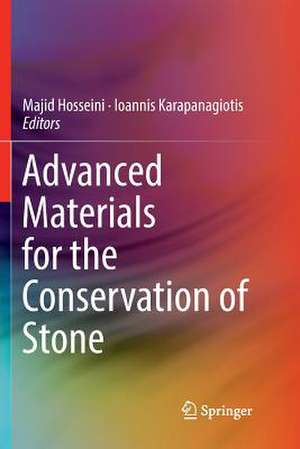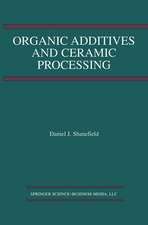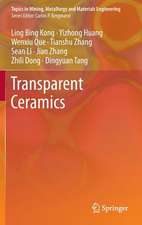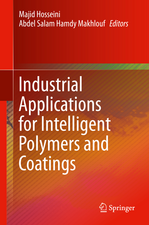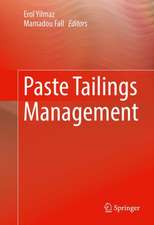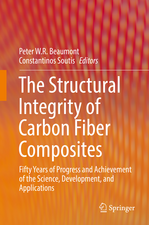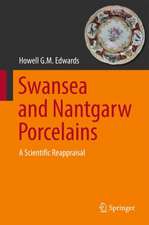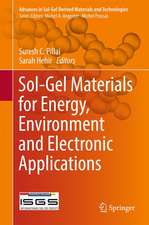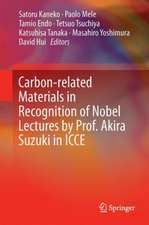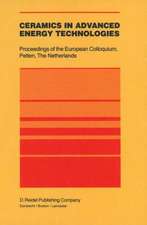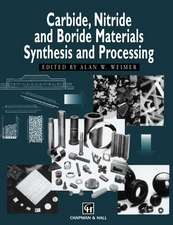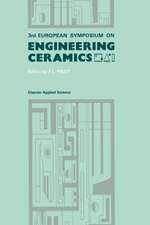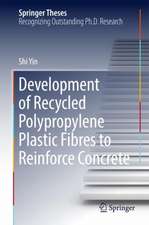Advanced Materials for the Conservation of Stone
Editat de Majid Hosseini, Ioannis Karapanagiotisen Limba Engleză Paperback – 4 iun 2019
This book identifies novel advanced materials that can be utilized as protective agents for the preservation of stone. The innovative solutions to stone conservation presented here result in increased sustainability, reduced environmental impact, and increased social and economic benefits. It provides an overview of recent trends and progress in advanced materials applied to stone protection. It also explores the scientific principles behind these advanced materials and discusses their applications to diff erent types of stone preservation efforts. Essential information as well as knowledge on the availability and applicability of advanced nanostructured materials is also provided, with focus placed on the practical aspects of stone protection. Th e book highlights an interdisciplinary eff ort regarding novel applications of nanostructured materials in the advancement of stone protection. It provides insight towards forthcoming developments in the fi eld. Advanced nanostructured materials are designed and developed with the aim of being chemically, physically, and mechanically compatible with stone. Advanced materials for stone conservation that are characterized by several functional properties are considered in this book. These include the physico-chemical, protective, and morphological properties, eco-toxicity, and mechanisms of degradation. The authors present a thorough overview of cutting–edge discoveries, detailed information on recent technological developments, breakthroughs in novel nanomaterials, utilization strategies for applications in cultural heritage, and the current status and future outlook of the topic to address a wide range of scientific communities.
| Toate formatele și edițiile | Preț | Express |
|---|---|---|
| Paperback (1) | 729.06 lei 6-8 săpt. | |
| Springer International Publishing – 4 iun 2019 | 729.06 lei 6-8 săpt. | |
| Hardback (1) | 1009.22 lei 6-8 săpt. | |
| Springer International Publishing – 30 ian 2018 | 1009.22 lei 6-8 săpt. |
Preț: 729.06 lei
Preț vechi: 889.09 lei
-18% Nou
Puncte Express: 1094
Preț estimativ în valută:
139.50€ • 146.05$ • 115.43£
139.50€ • 146.05$ • 115.43£
Carte tipărită la comandă
Livrare economică 05-19 aprilie
Preluare comenzi: 021 569.72.76
Specificații
ISBN-13: 9783319891637
ISBN-10: 3319891634
Pagini: 332
Ilustrații: XII, 332 p. 124 illus., 89 illus. in color.
Dimensiuni: 155 x 235 mm
Greutate: 0.49 kg
Ediția:Softcover reprint of the original 1st ed. 2018
Editura: Springer International Publishing
Colecția Springer
Locul publicării:Cham, Switzerland
ISBN-10: 3319891634
Pagini: 332
Ilustrații: XII, 332 p. 124 illus., 89 illus. in color.
Dimensiuni: 155 x 235 mm
Greutate: 0.49 kg
Ediția:Softcover reprint of the original 1st ed. 2018
Editura: Springer International Publishing
Colecția Springer
Locul publicării:Cham, Switzerland
Cuprins
Superhydrophobic coatings for the protection of natural stone.- Advanced Conservation Methods for Historical Monuments.- The protection of marble surfaces: the challenge to develop suitable nanostructured treatments.- A hybrid consolidant of nano-hydroxyapatite and silica inspired from patinas for stone conservation.- Compatible Mortars for the Sustainable Conservation of Stone in Masonries.- Inorganic Nanomaterials for the Consolidation and Antifungal Protection of Stone Heritage.- Nanomaterials for the consolidation of stone artifacts.- Testing efficiency of stone conservation treatments.- Challenges of alkoxysilane-based consolidants for carbonate stones: from neat TEOS to multi-purpose hybrid nanomaterials.- Analytical investigations and advanced materials for damage diagnosis and conservation of monument’s stucco.- Nanotechnology for the Treatment of Stony Materials’ Surface against Biocoatings.- Preserving Cultural Heritage Stone: Innovative Consolidant, Superhydrophobic, Self-Cleaning and Biocidal Products.- Antimicrobial properties of nanomaterials used to control microbial colonization of stone substrata.- Advanced and novel methodology for scientific support on decision making for stone cleaning.- Index.
Notă biografică
Dr. Majid Hosseini has earned both his Ph.D. and M.S. degrees in Chemical Engineering from The University of Akron in Ohio, United States. He has also completed an MSE degree in Manufacturing Engineering at UTRGV in Texas, USA, and a bachelor’s degree in Chemical Engineering at Sharif University of Technology in Tehran, Iran. He has edited high caliber books, book chapters, authored multiple research articles, and has co-invented patents application technologies. He has served as a key speaker at national and international conferences and has been actively engaged in technology development. Dr. Hosseini’s research interests, expertise, and experiences are diverse, ranging from smart bio/nanomaterials, smart polymers and coatings, nanoparticles, bio/nanotechnology, to bioprocess engineering and development, biomanufacturing, biofuels and bioenergy, and sustainability. Dr. Hosseini works at The University of Texas Rio Grande Valley in Edinburg, Texas, USA.
Dr. Ioannis Karapanagiotis has obtained his Ph.D. in Materials Science and Engineering from the University of Minnesota, United States, and his Diploma in Chemical Engineering from the Aristotle University of Thessaloniki, Greece. He serves as a member in Editorial Boards and reviewer in several journals (more than 70), and he has published multiple research papers (more than 130) in peer reviewed journals, books and conference proceedings. Dr. Karapanagiotis specializes in interfacial engineering and its applications on the protection and conservation of the cultural heritage, and in the physicochemical characterization and analysis of cultural heritage materials which are found in historic monuments, paintings, icons, textiles, manuscripts. Dr. Karapanagiotis is an Associate Professor and Head of the Department of Management and Conservation of Ecclesiastical Cultural Heritage Objects, University Ecclesiastical Academy of Thessaloniki, Greece.
Dr. Ioannis Karapanagiotis has obtained his Ph.D. in Materials Science and Engineering from the University of Minnesota, United States, and his Diploma in Chemical Engineering from the Aristotle University of Thessaloniki, Greece. He serves as a member in Editorial Boards and reviewer in several journals (more than 70), and he has published multiple research papers (more than 130) in peer reviewed journals, books and conference proceedings. Dr. Karapanagiotis specializes in interfacial engineering and its applications on the protection and conservation of the cultural heritage, and in the physicochemical characterization and analysis of cultural heritage materials which are found in historic monuments, paintings, icons, textiles, manuscripts. Dr. Karapanagiotis is an Associate Professor and Head of the Department of Management and Conservation of Ecclesiastical Cultural Heritage Objects, University Ecclesiastical Academy of Thessaloniki, Greece.
Textul de pe ultima copertă
This book identifies novel advanced materials that can be utilized as protective agents for the preservation of stone. The innovative solutions to stone conservation presented here result in increased sustainability, reduced environmental impact, and increased social and economic benefits. It provides an overview of recent trends and progress in advanced materials applied to stone protection. It also explores the scientific principles behind these advanced materials and discusses their applications to diff erent types of stone preservation efforts. Essential information as well as knowledge on the availability and applicability of advanced nanostructured materials is also provided, with focus placed on the practical aspects of stone protection. Th e book highlights an interdisciplinary eff ort regarding novel applications of nanostructured materials in the advancement of stone protection. It provides insight towards forthcoming developments in the fi eld. Advanced nanostructured materials are designed and developed with the aim of being chemically, physically, and mechanically compatible with stone. Advanced materials for stone conservation that are characterized by several functional properties are considered in this book. These include the physico-chemical, protective, and morphological properties, eco-toxicity, and mechanisms of degradation. The authors present a thorough overview of cutting–edge discoveries, detailed information on recent technological developments, breakthroughs in novel nanomaterials, utilization strategies for applications in cultural heritage, and the current status and future outlook of the topic to address a wide range of scientific communities.
- Provides a basis for advanced materials technology assessments applied to stone conservation;
- Presents a thorough overview of cutting–edge discoveries and detailed information on recent technological developments, the current status, and future outlook;
- Covers environmental impact, sustainability, social eff ects, and economic benefits;
- Addresses a wide range of global scientific communities that develop and apply advanced materials for conservation purposes.
Caracteristici
Provides a basis for advanced materials technology assessments applied to stone conservation; Presents a thorough overview of cutting–edge discoveries and detailed information on recent technological developments, the current status, and future outlook; Covers environmental impact, sustainability, social eff ects, and economic benefits; Addresses a wide range of global scientific communities that develop and apply advanced materials for conservation purposes.
